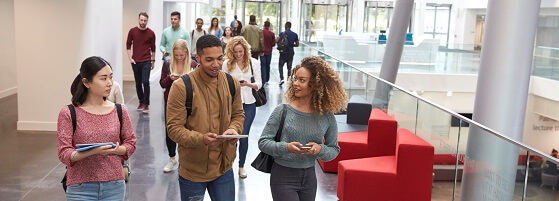6 March 2023
A community-based approach to advancing thinking and practice in student engagement: Some reflections

Author
Professor Sam Elkington
Teesside University, and Student Retention and Engagement Working Group members*
In January 2021, a group of higher education professionals heralding from five higher education institutions (HEIs) in the northeast, comprising the Three Rivers consortium of universities, came together to consider the plight of student engagement in higher education with the initial intention of presenting key insights at the Three Rivers Annual Conference in June 2021.
The context for the group to collaborate was the increased diversity in the cultural and educational backgrounds of students, accelerated more recently by the large-scale changes and challenges to teaching arrangements that have been prompted by the global pandemic and higher educations’ response to it. Institutions have responsibility to ensure that academic programmes and the student experience are shaped in ways that provide the opportunity for study success for all students, regardless of their backgrounds, experiences or mode of study.
In a collective response, and over the course of several virtual ‘gatherings’, colleagues from across a variety of professional roles (academic, leadership, student support) openly shared, reflected on and discussed their various practice experiences of engaging different groups of students. This reflection and exploration has revealed an increasingly complex reality for HEIs in which they need to be dynamic and responsive, recognising and addressing the varying needs of students as they impact on academic studies and the wider student experience, and adjusting their programmes and processes to accommodate differing student cohorts and modes of study.
What do our students need now?
Across universities there is well documented decreased engagement in live sessions due to many reasons, including cost of living and increased anxiety among our students. This led the group to critically consider two prominent questions - What do our students need now? How do we as academics, support professionals and learning service staff facilitate this?
There is no doubt that the move to almost wholly online learning during the COVID pandemic has shifted student perception of engagement and we are seeing wide-ranging anecdotal evidence of a preference for online lectures. It can be argued that online content allows students to study at their own speed and in a time that suits their lifestyle. At the same time, however, this mode of study warps established methods by which students have typically connected with their course and each other. It also, arguably, restricts opportunities for the creation of real and meaningful discussion which is vital to the notion of developing as a critical learner, as well as a sense of connection and belonging.
The real question here is, can we really change a student’s pattern of attendance, or do we adapt to support them in the post-COVID learning environment? As a group, we have discussed this extensively which has resulted in the collation of a series of practical insights for creating support for learning of all students, no matter their mode of study:
- Begin with where students (and staff) are now - will prior models and measures of engagement suffice? Consider/revisit UK Quality Code, Advice and Guidance: Student Engagement (non-mandatory practices in England!) or sparqs’ Professional Standards Framework for Student Engagement - as a touchstone for our current student and staff experience.
- Be explicit in the skills and personal development opportunities of on-campus, in-person and virtual activities. We can’t assume they are an implicit part of the student experience now.
- Consider how your HEI sets the scene and models for student engagement - pre-transition and initial engagement. For example, the use of technology and virtual rehearsal for in-person learning activity to reduce potential anxiety and/or ‘continuous induction’ through different stages of the student journey.
- Conceptualise student engagement in as broad a context as possible, given the limitations placed on HEI to ‘flex’. We have proposed three emergent forms of engagement to aid this expanded framing:
- procedural engagement (hand in rates, registering attendance, etc)
- pedagogical engagement (involvement in discussion groups, questioning, practical activity, responding to formative feedback)
- pragmatic engagement (what is possible given constraints of personal circumstance?)
- Review how all functions within the institution - academic and professional support - align to support engagement and success in these new contexts.
A ‘true’ community of practice
So, what have we learned and where might we take our collaborative inquiry? Coming together as a diverse group of higher education professionals, we have grown to be a ‘true’ community of practice through sharing our practice and ideas in open and supportive (digital) gatherings. Permission has been given to ‘free-wheel’ in a safe space which has, in turn, encouraged us to leverage and build on the diversity of participant roles to promote rich reflection on issues facing the sector without being hampered by the micropolitics of our own individual professional situations. What this has provided is an unpressurised, open, honest, and equal platform for humble inquiry into the changing landscape of student engagement in higher education.
By dissecting the multi-layered facets of student engagement, each participant has been able to take away something in terms of shared learning, new connections and heightened confidence to have a go at something new. It is powerful indeed when a colleague offers a valuable suggestion or an alternative view which you’ve never had reason to consider before.
In the space of 12 months, the group has created a sense of purpose in which there is genuine collaboration and co-creation of content and direction. How can we ‘bottle’ this experience to pass it on? Surely the starting point must be sharing - reaching out to other groups doing similar work to our own - and then sharing those conversations again.
Many aspects of post-pandemic teaching and learning will challenge us, but we embrace the fact that it brought this group into existence. Removing physical and logistical barriers led to a greater sense of willingness, engagement and commitment that could feed into a more sustainable higher education community of practice life cycle - one with potentially a more genuine, extended and deeper positive impact for staff and students alike.
Related QAA Member resources
- The Hallmarks of Success playbook: Student-centred learning and teaching help members explore the conditions needed to achieve success in digital and blended delivery, identify potential roadblocks to success and determine how they can be navigated. It focuses on the interrelated themes of student engagement, retention, achievement and progression in the context of hybrid learning.
- The Supporting Successful Student Transitions project offers members positive approaches and practical solutions to help support a range of transitions, such as moving into higher education for the first time or returning after a break.
- The Creating Inclusive Communities resource offers support for subject learning communities to explore ways to embed inclusion and accessibility in the curriculum to enhance the student experience.
* Contributing Student Retention and Engagement Working Group Members:
- Professor Megan Bruce (Durham University)
- Dr Emma Croft (Northumbria University)
- Libby Hampton (University Centre Quayside)
- Dr Elizabeth Hidson (University of Sunderland)
- Eugenie Johnson (Newcastle University)
- Dr Elisa Lopez-Capel (Newcastle University)
- Dr Litka Milian (Durham University)
- Emily Parkin (Northumbria University)
- Dr Helen Tidy (Teesside University)
- Dr Nicola Watchman Smith (Teesside University)
- Andrew Welsh (Northumbria University)
- Stephen Williamson (Northumbria University)
- Cass Winlow (University of Sunderland)
